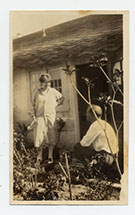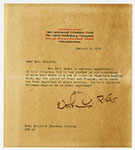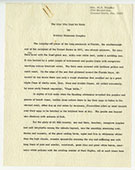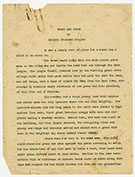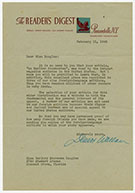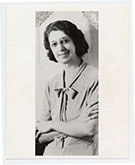Marjory Stoneman Douglas: Writer & Conservationist
Miami
The move to Florida was a veritable turning point in the life of Marjory Stoneman Douglas. It was the place where she found her voice both as a writer and a conservationist. She was always grateful to her father for "giving her Florida". When she arrived in Miami in 1915, she was 25. Her father, Frank Stoneman, was now editor-in-chief of the Miami Herald and hired her as the newspaper's society columnist. The assignment was the beginning of Marjory's writing career:
I was delighted to be working on the Herald. It was as if everything else that I had been doing since college had been all wrong and suddenly I found what I was meant to do--even if it was as simple as writing society blurbs in a small city newspaper. I didn't care what I was writing about as long as it was writing. It was a great leap forward in my individuality. (Voice of the River, p. 102)
Her work for the newspaper was interrupted by her decision to volunteer with the American Red Cross during the war. Even then, she was assigned to write articles about the accomplishments of the organization in Europe. The life of a volunteer during the war was often strenuous but Marjory, who cherished the French side of her ancestry, kept fond memories of her visit to Paris: "I first saw Paris in a kind of blue-gray light, with all its buildings so harmonious with their mansard roofs and their elegant proportions, everywhere the grace of trees and little green spaces and parks, parks of gravel instead of grass because people used them so much that grass wouldn't grow there. All Americans are supposed to feel the charm of Paris, and I for one did." (Voice of the River, p. 115)
Upon her return from Europe Marjory was made assistant editor of the Miami Herald and from 1920 to 1922 authored a column called "The Galley" which became a place for her to discuss all subjects of interest from gardening and landscaping to the plight of women, the forced labor of vagrants and living conditions of segregated Coconut Grove. As the author of "The Galley" she always showed great interest in all topics related to Florida. She would later explain in her autobiography that: "It was in the column that I started to talk about Florida as landscape and as geography, to investigate it and to explore it. To me this was more important than getting tied up with a man." (Voice of the River, p. 127)
Her penchant for regionalism continued to be reflected in her writings even after she quit the Herald to become a freelance writer. In 1923, Marjory Stoneman Douglas, left her job at the newspaper and its pressures. The next 20 years would be a very active and successful period in the genre of short story writing. Many of her narratives were published in magazines, primarily in the Saturday Evening Post. The story "Plume" spoke of the plight of birds being killed for the adornment of women's hats and of the efforts to curtail the industry. For "He Man" and "The Peculiar Treasure of Kings" published in 1927 she won the prestigious O' Henry Award. She also wrote essays such as "An Argument for the Establishment of a Tropical Botanical Garden in South Florida" as well a short play, "Gallows Gate" and won the first prize in the state of Florida's "little-theatre competition".
This period was also marked by the beginnings of her involvement with the University of Miami in various capacities related to writing and publishing. She was "Short Story Coach" from 1927 to 1929 and Associate Professor of English form 1929 to 1933. At the 1942 University of Miami Winter Institute Of Literature, she lectured on the "Rise and Fall of the Short Story". Subsequently, she would be made Editor of the University of Miami Press and became Founder- President of the University of Miami Friends of the Library. In 1952, Marjory Stoneman Douglas was awarded an Honorary Doctor of Letters by the University of Miami.
